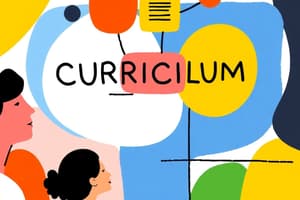Podcast
Questions and Answers
What is the primary goal of the curriculum?
What is the primary goal of the curriculum?
- To fill classrooms with students
- To ensure schools have adequate facilities
- To enable children to lead productive lives (correct)
- To provide teachers with a daily plan
Which aspect is vital to student achievement according to the curriculum?
Which aspect is vital to student achievement according to the curriculum?
- The guidance of the curriculum (correct)
- The level of teacher experience
- The types of assessments used
- The school facilities available
What determines the quality of a curriculum?
What determines the quality of a curriculum?
- Students' quality of learning and its application (correct)
- The standards set by educational authorities
- The amount of resources allocated to the program
- The popularity of the school
Why is the curriculum considered the heart of the teaching profession?
Why is the curriculum considered the heart of the teaching profession?
What elements should be included in curriculum planning?
What elements should be included in curriculum planning?
What is the primary reason for the dynamic nature of curriculum in education?
What is the primary reason for the dynamic nature of curriculum in education?
How can curriculum be defined from a traditional perspective?
How can curriculum be defined from a traditional perspective?
Which of the following is NOT mentioned as a reason for failed curriculum projects?
Which of the following is NOT mentioned as a reason for failed curriculum projects?
What does the term 'curriculum' literally mean according to its Latin origin?
What does the term 'curriculum' literally mean according to its Latin origin?
Why is it crucial for teachers to understand the curriculum?
Why is it crucial for teachers to understand the curriculum?
Flashcards are hidden until you start studying
Study Notes
Curriculum Overview
- Curriculum is a dynamic component of education, interpreted variously by experts.
- Essential for teachers to understand as it impacts every educational system.
Learning Outcomes
- Ability to discuss the nature and importance of curriculum.
- Definition of curriculum from both traditional and progressive perspectives.
- Differentiation among various types of curriculum.
Definition and Importance of Curriculum
- Originates from Latin "currere" meaning "to run" or "to run a course."
- Represents a comprehensive, content-rich course of study approved for schools.
- Encompasses planned learning outcomes, subjects, materials, and assessment methods.
- Fundamental to the existence of educational systems and guides teachers in their instruction.
- Directly influences student achievement and the acquisition of knowledge, values, and skills.
Purpose of Curriculum
- Aims to enable students to develop knowledge and skills for productive lives.
- Focuses on nurturing successful learners, responsible individuals, and active societal contributors.
- Quality of curriculum assessed by the learning outcomes achieved by students.
Types of Curriculum
-
Intended (Official) Curriculum:
- Formulated by national agencies, professional organizations, and international bodies.
-
Written Curriculum:
- Includes formal instructional documents like syllabi and lesson plans.
-
Taught (Implemented) Curriculum:
- Encompasses classroom activities carried out to meet learning outcomes.
-
Supported Curriculum:
- Refers to resources that aid in the implementation, such as textbooks and school facilities.
-
Assessed (Tested) Curriculum:
- Involves evaluation methods to assess student learning throughout and at the end of instruction.
-
Learned (Received) Curriculum:
- Reflects the actual learning outcomes attained by students, influencing behavior and understanding.
-
Entitlement Curriculum:
- Represents societal expectations on what learners should acquire from education.
Teacher's Roles in Curriculum
-
Writer:
- Creating educational materials such as textbooks and modules.
-
Planner:
- Developing lesson plans and schedules for effective implementation.
-
Initiator:
- Opening avenues for implementing recommended curriculum changes.
-
Innovator:
- Staying creatively engaged with current trends and curriculum advancements.
-
Implementor:
- Actively guiding and facilitating student learning experiences.
-
Evaluator:
- Assessing the effectiveness of the curriculum and making necessary adjustments.
Reflection
- All seven roles teachers play in relation to curriculum are crucial and cannot be overlooked.
- Teaching is a multifaceted profession that requires versatility and adaptability in curriculum implementation.
Studying That Suits You
Use AI to generate personalized quizzes and flashcards to suit your learning preferences.




